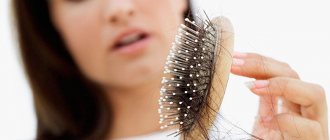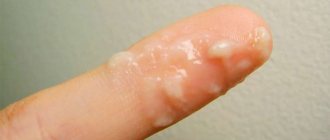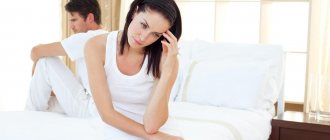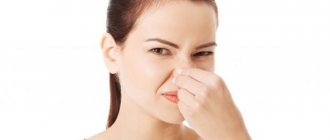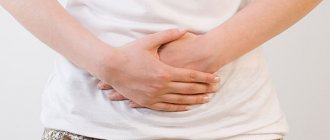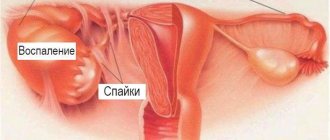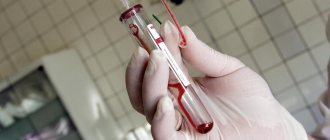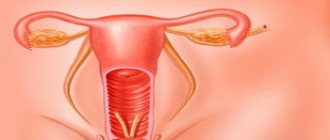More than half of women, with the approach and onset of menopause, experience specific vegetative-vascular paroxysms - hot flashes, which can be characterized as a sudden wave of heat throughout the body, accompanied by profuse sweating, palpitations, and often an increase in blood pressure. Hot flashes during menopause reduce emotional mood, interfere with concentration, and impair performance. Correction of such conditions is carried out depending on the severity and frequency of manifestations: by prescribing hormone replacement therapy (HRT), modifying the diet, lifestyle, and using drugs alternative to hormones.
Hot flashes are one of the common unpleasant symptoms of menopause
During menopause
Attacks begin several years before menopause. At this stage, estrogen levels decrease, to which the body responds by increasing follicle-stimulating hormone. This is the main trigger for all symptoms as a protective reaction to hormonal imbalance. As a result, the heart rate increases, blood vessels dilate, sweating increases, and hot flashes occur during menopause.
For each woman, the period of menopause occurs individually; after time, the body completes the restructuring, and the body’s thermoregulation stabilizes. There is no specific answer for how long hot flashes last during menopause, as well as other signs of changes in hormonal status. The period can last 10-15 years, but for some it will end in a year. Factors that significantly prolong the condition are early menopause, menopause due to the use of medications.
- Signs of menopause in a woman
- Menopause at 40 years old - causes, symptoms and first signs, diagnosis, treatment methods and prevention
- Hypertension during menopause: symptoms and treatment
Use of hormonal drugs
The most common method of treating not only hot flashes, but also menopause in general, are hormonal drugs. Hormone therapy involves the use of hormonal medications that contain estrogen. In addition to estrogen, they may also contain progestogen. A group of these drugs is available in different forms: patches, tablets and ointments.
The body's response to hormonal drugs is unpredictable. Some women gain or lose weight, some experience significant breast enlargement, and others. It's from these drugs. Modern hormonal medications contain minimal levels of hormones, which reduces the risk of side effects. These drugs also have some contraindications for use:
- Oncological heredity (uterine and mammary gland cancer on the maternal side);
- Risk of cancer;
- Endometrial cancer;
- Breast cancer;
- Liver or kidney diseases;
- Thrombophlebitis (the appearance of blood clots and inflammation in the veins).
Side effects vary, but the most dangerous is considered to be an increase in blood clotting. This entails the formation of blood clots in the veins. In addition, swelling, headaches, hardening of the mammary glands and difficult digestion occur, which is associated with stagnation of bile.
If there are contraindications to the use of hormonal drugs, doctors recommend using herbal remedies. Drugs in this group are divided into two types:
- Phytoestrogens;
- Phytomodulators.
Today, the most effective and popular drug in this group is Klimadinon. It contains: black cohosh rhizome extract; it has been used in this direction for several decades now - in the treatment of menopausal disorders.
Hot flashes not associated with menopause
Such attacks are observed not only during menopause, but during other periods of women’s lives - pregnancy, ovulation. The cause of hot flashes not associated with menopause may be a change in climate or disease: problems with the thyroid gland, vegetative-vascular dystonia, neurological disorders, hypertension. With frequent manifestations, a medical examination is necessary.
Differential diagnosis
The first fundamental element in the diagnostic process is, of course, represented by the anamnesis, in order to evaluate in particular:
- gender of the patient;
- age;
- last menstrual cycle;
- possible chronic treatments;
- any major chronic diseases.
If present, some factors/symptoms may directly indicate pathological forms:
- tachycardia, exophthalmos ( bulging eyes ), excessive weight loss, arterial hypertension (persistent increase in blood pressure) are characteristic signs of hyperthyroidism;
- young age and menstrual irregularities can lead to an imbalance in the hormonal axis;
- the presence of recurring headaches and other neurological symptoms indicates damage to the central nervous system.
In addition to objective examination and collection of information, it may be useful:
- Hormone analysis: sex hormones;
- TSH and thyroid hormones.
- vaginal (transvaginal) ultrasound examination of the pelvis,
Night hot flashes in women
Hot flashes and heavy sweating that occur at night are not always typical only for menopause. Night hot flashes in women can be caused by various factors, such as:
- eating spicy, salty, spicy foods, alcohol, coffee before bedtime;
- active physical activity in the evening;
- warm clothes, hot weather, stuffy room during sleep;
- emotional stress;
- taking medications;
- diseases (tuberculosis, oncology, hypoglycemia, hyperthyroidism), stroke.
What additionally provokes hot flashes
Hot flashes during menopause depend on a large number of circumstances.
Let's consider what factors provoke this unpleasant symptom in a woman:
- Stress. They are dangerous for any age, disrupt the functioning of the nervous system and thereby contribute to even greater changes in the functions of the hypothalamus. Experts classify all strong emotional shocks, both negative and positive, as stress. Therefore, a lady who is at menopausal age should not arrange big surprises.
- Use of medications. Hot flashes are provoked by the following groups of medications: antidepressants, psychotropic drugs, vasodilators, anti-estrogens, chemotherapy drugs, diet pills. What to do? It is necessary to acquire a useful habit - before starting to take the medicine, you need to carefully study all the instructions for its use, including the side effects section. So, the lady will be warned in advance about the danger and will not experience unnecessary worries.
- Diet. If a woman consumes a lot of fatty and spicy foods, as well as large quantities of alcohol and coffee, then she additionally excites her nervous system, which is already tense. After eating, blood circulation is stimulated, which leads to the release of heat in the body.
- Excess carbohydrates. When a lady eats a lot of sweets, her body has an excess of energy, which causes the body to overheat.
- Tight clothes. Clothing that is too tight and warm compresses the blood vessels, and hot flashes occur.
- Frequent stay in hot and stuffy rooms. If a woman often visits a bathhouse, sauna, or takes a hot bath for a long time, her body temperature rises. Being in such a place, the lady provokes an attack.
As you can see, a woman can avoid many factors that can cause menopausal hot flashes to begin. By changing her lifestyle, she will significantly reduce the intensity of this unpleasant symptom.
Causes of hot flashes
The nature of the phenomenon is explained by a decrease in estrogen, as a result of which biochemical processes in the brain change, and specifically the work of the hypothalamus. This gland regulates sleep, appetite, body temperature, hormone production, and a malfunction is comparable to a malfunction of a room thermostat. The hypothalamus increases the heart rate, a signal is sent to the vessels, stimulating them to contract, this increases the temperature, and the body feels warm.
In reality, the body is not cold, and it quickly dilates blood vessels to cool itself. A condition that causes blood flow to the chest and face, felt like a hot, strong wave, is replaced by an ebb. The intensity of the attack can be different for everyone - from a slight rise in heat with drops of sweat to fever with profuse sweating. The cause of hot flashes in women and the mechanism of communication between estrogen and the hypothalamus are still being studied to this day.
- Menopause in women - symptoms, age, treatment with drugs. Folk remedies for menopause in women
- Tablets for menopause against hot flashes, hormonal and non-hormonal - list of the best drugs with prices
- Night sweats - causes in women. Increased sweating during sleep in women as a symptom of the disease
How is non-drug treatment carried out?
With hot flashes, the body gains temperature, the face and neck turn red, and the body needs cooling. Women who suffer from hot flashes should choose clothes made from natural fabrics. It's good if you have several layers of clothing on so that if necessary, you can get rid of one or more.
In addition to clothing, physical exercise and a special diet help in the fight against hot flashes. The diet includes:
- Elimination of fatty and spicy foods;
- Elimination of alcohol;
- Elimination of strong tea and coffee from the diet.
When going for a walk, you should always have a bottle of chilled water and a fan with you.
Symptoms
It is difficult to confuse an attack with a viral or infectious condition. Symptoms of hot flashes in women include the following:
- The attack begins with a sensation of a sharp flow of blood to the upper part of the body. The skin of the face and décolleté turns red, and there is intense heat in the chest and arms.
- Heart contractions increase, dizziness begins, nausea, weakness, fatigue and lack of air occur.
- Body temperature jumps briefly, then returns to normal with severe sweating and even chills.
- Perspiration may appear at the upper lip, or may cover the entire body. Heavy sweating forces you to change clothes, dry yourself with a towel or take a shower.
Main symptoms of menopause
A word like menopause scares every woman who reaches the age of over forty. Menopause is the time when the egg stops working in the body; against the background of this process, the hormonal background changes greatly. Main symptoms:
- You can understand about the imminent arrival of menopause if you pay attention to the irregularity of the onset of menstruation and changes in their abundance. There is no exact information about what to do when menopause occurs and exactly when it occurs. Everything will directly depend on the characteristics of the woman’s body.
- The menopausal period most often occurs due to serious disturbances in the functioning of the hormonal system, this becomes the main factor in the appearance of a surge of heat in the fair sex.
- Many also ask whether such changes can occur in men. Medicine has proven that men between the ages of forty and fifty suffer from some changes in the body that are very similar to women. These may include fever, mood swings, deterioration in memory, concentration, and a constant feeling of fatigue. Of course, it is important to understand that the symptoms and treatment of hot flashes will vary significantly in women, since the functioning of the hormonal system is very gender dependent.
The doctor can explain the course of this phenomenon in some detail. Due to a lack of hormones in the body, the transfer of information between organs and systems begins to deteriorate. Inaccurate data goes to the brain center, which regulates heat exchange in the body.
Most often, hot flashes become a sign of early menopause. It is after them that other symptoms of menopause begin to appear. Doctors note that hot flashes in women occur suddenly, so it is impossible to accurately determine their time; they can occur in the most inconvenient place. Early and artificially induced menopause most often worries a woman at night. To alleviate the situation, it is first important to go to an appointment with a specialist, pass all the prescribed tests and undergo diagnostics. All this will help to study the functioning of hormonal levels more carefully, and based on the information received, prescribe competent treatment.
Features of night disturbances
Unpleasant sensations that arise during deep sleep often go away along with a large number of unpleasant feelings. This may include:
- sweating;
- feeling of chills;
- anxiety;
- redness of the skin;
- increase in pressure indicator.
If you have symptoms of hot flashes, you need to pay special attention to the following symptoms: severe manifestations of menopause, copious amounts of sweat, after each night attack you have to take new underwear. Doctors report that attacks at night are much stronger than during the day. This occurs due to the accumulation of fatigue and overstrain, as well as the inability to restore one’s condition during sleep.
Not in all cases it is possible to get rid of negative symptoms in time and quickly restore the body. Difficulty sleeping can often lead to hot flashes at night. For women during menopause, this problem occurs quite often. Sleep problems significantly worsen the situation, affecting your overall well-being, causing regular fatigue and a feeling of depression. Such symptoms ultimately develop a depressive state and serious difficulties with the mental system. It is important to remember that this condition occurs in all women, so you need to prepare for it in advance.
The duration of a woman’s night hot flash will depend on the functioning of her body and basic systems. The hereditary factor also has a strong influence.
Individual manifestations
There are a large number of medications against hot flashes during menopause, but only a doctor should prescribe a specific remedy, based on the information obtained after examining the woman’s body. It is also important to remember that the symptoms of menopause most often lead to disorders in the nervous system.
An additional negative effect can be caused by: an incorrectly formulated diet, a lack of oxygen-enriched air in the room where the woman spends most of her time. All this only worsens the condition of the body and provokes a surge of greater strength, reduces the body’s ability to independently resist the problem and forces it to take various medications for treatment, which very often carry side effects.
Some women report that they experience no difficulty at all during menopause. Increased sweating and severe chills occur rarely, but go away immediately and are easily tolerated, which does not attract much attention. Most often, the strength of the tide depends on the functioning of the woman’s hormonal system and the general state of her health.
How to get rid of hot flashes
What to do with the situation if it cannot be avoided? You need to stop what you are doing for a while, sit down and relax in a comfortable position. Instead of trying to fight the attack, it is important to let it roll and recede like a wave. To get relief, you need to take into account the factors that aggravate the condition and listen to simple tips that will help you cope with it.
- Avoid stress.
- Spend less time in stuffy rooms. Sleep in a ventilated room.
- Stop smoking.
- Replace coffee with green tea. Consume liquids and food warm.
- Eat a diet with less meat, more vegetables, fruits and foods rich in vitamin E and potassium.
- Avoid synthetic and shapewear, tight-fitting clothing.
- Replace mental stress with sports, preferring walking and swimming.
- Replace hot baths, saunas and steam baths with a contrast shower.
- What medications to take during menopause for hot flashes is decided solely by the doctor, who will help to properly treat the condition and get rid of hot flashes, if not completely, then at least significantly alleviate them.
How to change your diet
Nutrition also plays a significant role. It is important to adjust your diet after menopause. You need to eat as many fruits and vegetables as possible.
You need to drink in small portions, but 5-6 times a day. The diet should contain:
- lean meats;
- beef liver;
- dairy products;
- greens, vegetables, fruits;
- berries and dried fruits;
- cereals;
- fish.
Some products are strictly prohibited. It is highly undesirable to consume:
- margarine;
- fried;
- fat;
- confectionery;
- semi-finished products;
- fast food;
- sausages.
It is important to adhere to the drinking regime. You need to drink 1.5-2.5 liters of clean water per day.
It is recommended to give up sweets
Remedies for hot flashes during menopause in women
In addition to lifestyle recommendations, women need to take medications during menopause for hot flashes and other symptoms. Treatment includes two types of drugs:
- non-hormonal medications, including sedatives, herbal and homeopathic medications;
- hormonal drugs.
Also accepted:
- Climacterin;
- Femicaps;
- Qi-klim;
To gently reduce the symptoms of menopause, non-hormonal products based on herbal components are used, for example, the dietary supplement ESTROVEL® capsules - a complex of phytoestrogens, vitamins and microelements, the components of which act on the main manifestations of menopause. ESTROVEL® contains vitamin K1 and boron, which help reduce the risk of osteoporosis.
What are the general recommendations?
To reduce the severity of hot flashes, you should lead a healthy lifestyle. You need to give up smoking and alcohol abuse. You also need to take walks in the fresh air every day.
A woman must adhere to a daily routine. Loads alternate with rest. You need to sleep at least 6 hours.
Playing sports will not be amiss. The most preferable are fitness and yoga. Training should be moderate but regular. You can give preference to aromatherapy. To do this, you should stock up on essential oils and a special lamp.
Folk remedies for hot flashes during menopause
For those who are contraindicated in medication treatment, folk remedies for hot flashes during menopause - herbal mixtures with phytoestrogens and sedative effects - help ease the menopause. They reduce symptoms and support the body during hormonal changes. This:
- Red clover;
- fennel fruit;
- buckthorn bark;
- peppermint leaves;
- wormwood herb;
- linden flowers.
Symptomatic treatment
Based on the course and symptoms of the disease, the doctor will select adequate therapy and prescribe conservative treatment for hot flashes.
There are a number of drugs to reduce unpleasant symptoms:
- Sedatives to support the nervous system - Persen, Novo-Passit, valerian, motherwort.
- Hormonal agents - Premarin, Proginova (estrogen content), Klimen, Divina, Klimara (progesterone content).
- Antihypertensive drugs - to normalize blood pressure.
- Folk remedies - flaxseed oil, clover, soybean.
Self-administration of medications is not recommended.
How to relieve hot flashes during menopause
A positive attitude is important to help relieve hot flashes during menopause. The less disturbances, the less frequent the tides. During an attack, it is important not to worry, trying to breathe regularly with your stomach. It is necessary to provide a flow of cool air. Clothing should not restrict movement. The supply of fluid lost during heavy sweating must be replenished, prevent dry skin and improve your well-being. Effective remedies, medical help, and positive thoughts will help you cope with the symptoms of menopause.
Treatment methods and prevention
There are many folk and medical preparations. When a hot flash begins, they can alleviate the patient’s condition a little, but the reaction to them is always completely individual. If for one person such remedies will help get rid of an unpleasant condition, then for another they will only provoke additional complications. Experts advise carefully considering your habits and lifestyle, sometimes this is enough. It is important to carry out the following procedures:
- sleep without covering;
- cool off in the shower before going to bed;
- you should not sleep during the day, as this leads to insomnia at night, which often goes away with particularly strong flushes of heat;
- do not eat food before bedtime;
- give up alcohol and smoking;
- do not load your body with strong physical exercise;
- use linen only from natural fabrics;
- in the evening, place an ice pack on your pillow for a while.
During the warm season, it is important to sleep with the windows open, maintaining a low temperature in the house. It is also best to make a separate sleeping place for yourself on the balcony or terrace in the summer. All these methods can bring a significant effect, but if they do not improve the condition, then it is important to go to a doctor who will prescribe a course of artificial hormones.
It is also important to note that a properly formulated diet can significantly improve the situation with hormonal changes. All unpleasant symptoms go away more easily in women who correctly organize their daily routine. It has been revealed that severe attacks at night are mainly complained of by people who are very tired at work and do not have time to sleep properly. It is very important to correctly distribute the duration of sleep at night (it should not be less than eight hours), you need to go to bed and get up at approximately the same hours.
Diagnosis of the problem
As a rule, by the time of menopause a woman already has some diseases, and during this period they can worsen. And changes in hormonal levels can provoke other very serious diseases, including cancer. Diagnostics are carried out in order to exclude possible pathologies and select an individual set of medications.
Examinations are most often laboratory and instrumental:
- determination of estrogen levels;
- blood tests for various tests;
- histology of the uterine mucosa;
- vaginal smears;
- urine tests;
- mammography;
- ultrasound examination of female organs;
- lipid profile;
- arterial pressure.
Often the patient is sent for consultation to specialized specialists: a cardiologist, endocrinologist, neurologist, somnologist.
Non-hormonal drugs after 45 years
After 40 years, women experience changes consisting of disruptions in the menstrual cycle. Changes in blood pressure, headaches and dizziness, constant irritability can be observed together with bright attacks of hot flashes.
Non-hormonal drugs are necessary to normalize the condition and have significantly fewer contraindications than hormonal drugs.
Among all, it is worth highlighting the most effective:
- "Remens" in the form of drops containing phytohormones.
- "Climaxan" in the form of lozenges with black cohosh extract.
- "Estrovel", which is a dietary supplement.
- "Qi-Klim" for the synthesis of sex hormones.
- "Menoforce" is a phytoestrogen and is made from sage.
Properly selected medications can soften the severe course of menopause and stabilize hormonal levels.
Nettle
This plant helps with debilitating bleeding. There are no contraindications, except for very rare individual cases. Nettle improves blood composition, increasing the number of platelets, and this promotes better clotting. Many medications for hot flashes during menopause contain nettle extract. The plant is used for making tea, baths and douches. The dried leaves are ground into powder and added to soups, porridges and salads. The simplest decoction, which can be used both for drinking and for douching, is prepared very simply. You need to take a tablespoon of dry herb and pour a glass of boiling water. Bring to a boil and pour into a thermos. After an hour, the decoction can be used. If necessary, dilute with cold boiled water.
Night sweats
If a woman can somehow cope with the sensations of heat in the chest, neck and face during the day, then at night it is more difficult to correct such conditions. A woman experiences a hormonal storm in the form of alternating waves of sweating and chills for 9-16 months. The fact that these phenomena are harmless and temporary is of little comfort, because adequate sleep is the key to good health.
A woman does not always feel hot flashes in her sleep; most often she wakes up from chills, after she has sweated. If such hot flashes occur regularly, you can only dream of normal sleep. Memory and concentration deteriorate, libido decreases. External signs of menopause increase emotional instability: the appearance of unwanted facial hair, weight gain, snoring, hair loss, thinning of the skin and mucous membranes of the urethra and vagina. If measures are not taken to stabilize the condition, the consequences can be more serious:
- The functioning of the immune system deteriorates;
- The heart and blood vessels suffer;
- The level of “bad” cholesterol and blood sugar – precursors of diabetes mellitus – increases;
- Reduced muscle tone and bone density (osteoporosis);
- Obesity and chronic depression are added;
- The risk of malignant neoplasms increases.
The conclusions, of course, are generalized; each woman’s symptoms manifest themselves individually. But even one of these consequences, for example, an increased risk of stroke or heart attack, should be a reason for urgent consultation with a cardiologist.
What does the doctor recommend?
Hot flashes become the basis for writing a prescription for a course of hormonal medications. Currently the most common are:
- "Proginova";
- "Cliogest".
Both options are applicable only on the basis of tests, identifying the level of estrogen in the blood, as well as conducting research for possible side effects, intolerance and allergic reactions. It is unacceptable to prescribe them to yourself under any circumstances. Sometimes it is recommended to take as additional therapy:
- "Klimonorm";
- "Divine."
Biological features
What are tides? The doctor can explain the essence of this phenomenon very clearly. The fact is that a lack of hormones provokes incorrect transfer of information between systems and organs. In particular, inaccurate data reaches the brain center that is responsible for heat exchange processes.
Often, a hot flash is the first sign of menopause, a sort of early bird, after which other “delights” of the menopause bouquet appear. It is noted that hot flashes are often sudden, it is impossible to predict them, they come in the most unexpected and inconvenient places. Artificially provoked, early menopause is often accompanied by night hot flashes. What can be done in such a situation to alleviate a person’s situation? First of all, visit a doctor, take the tests recommended by him to identify the characteristics of hormonal levels, and, based on the information received, select replacement therapy.
Ways to relieve symptoms
You can relieve the feeling of heat and other symptoms during menopause with the help of medications, folk, physiotherapeutic and homeopathic remedies, exercise and diet.
Medications
It is known that the basis of the pathological condition during menopause is a violation of hormone levels, which can be alleviated with appropriate therapy. Tablet preparations include two components:
- estrogens;
- gestagens.
Modern hormonal drugs do not promote weight gain and do not affect metabolic processes. In order to improve tolerability, the drugs contain a reduced dose of estrogens and an optimized amount of progestin components.
Hormonal medications can help relieve hot flashes and other symptoms of menopause:
- emotional disorders;
- osteoporosis;
- atherosclerosis.
Medicines can relieve discomfort and eliminate:
- hair loss;
- urinary incontinence;
- sexual disorders.
Despite the fact that hormonal drugs can significantly alleviate symptoms during menopause, in some cases their use is contraindicated:
- malignant tumors;
- acute thrombophlebitis;
- renal or liver failure;
- bleeding.
In such cases, the use of homeopathic remedies and phytoestrogens is recommended. A mandatory step in the presence of fever and hot flashes during menopause is the prescription of medications that normalize the functioning of the central nervous system, as well as improve metabolic processes.
To relieve the symptoms of menopause, doctors prescribe the following medications:
- vitamins A, C and E;
- tranquilizers, for example, Grandaxin;
- neuroleptics.
Traditional medicine
You can alleviate the manifestations of hot flashes during menopause with the help of folk remedies. Doctors advise taking:
- sage tea;
- blackberry leaf tea;
- valerian infusion.
To alleviate the condition, it is necessary to use medicinal herbs in courses that do not exceed two months. You can relieve symptoms, such as fever, with the help of an herbal mixture of the following plants:
- chamomile;
- yarrow;
- juniper berries;
- Melissa.
When treating, one should take into account the presence of other gynecological pathologies, in which the use of folk remedies may be contraindicated.
Homeopathic remedies
These drugs include plant materials and poisons, the action of which can alleviate the symptoms of menopause. In general, homeopathic remedies are safe, but should only be used after consulting a doctor.
Homeopathic medicines stimulate the female body's adaptability to various changing conditions. They are able to restore adaptive capabilities by stimulating certain receptors. In addition, homeopathic remedies eliminate headaches and nervous excitability, and have an antispasmodic and anti-inflammatory effect.
To relieve hot flashes and fever, gynecologists recommend using the following medications:
- Remens;
- Klimakt-Hel;
- Klimaktoplan.
As an alternative to hormonal treatment, phytoestrogens can be used to ease the symptoms of menopause. Such drugs have a less pronounced effect. However, the risk of adverse reactions is minimal.
Phytoestrogens are similar to female estrogens. Phytoestrogens can relieve hot flashes and reduce the risk of vascular, heart, endometrial and breast diseases.
Physiotherapy
In the absence of contraindications, the symptoms of menopause can be alleviated with the help of physiotherapy. After a preliminary consultation, the patient may be prescribed the following procedures:
- collar with novocaine according to Shcherbak;
- electroanalgesia;
- galvanization of the brain;
- general massage;
- massage of the cervical-collar area.
Sanatorium-resort treatment is very useful. It is advisable to use the autumn period to improve your health. Gynecologists recommend choosing resorts with mineral waters.
The following have a beneficial effect:
- balneotherapy;
- radon baths;
- hydrotherapy.
At home, you can take baths with a water temperature of no higher than 37 degrees. You can use medicinal herbs or pine extract. To relieve hot flashes, they also take a contrast shower in the morning and take cool foot baths in the evening.
Physical training
Regular physical activity and walking in the fresh air have a beneficial effect on the female body during hormonal changes. You can also relieve hot flashes with regular exercise. It is advisable to do light exercises daily, as well as breathing exercises. When the tide starts, you can inhale from your stomach, count to eight, and then exhale. Inhalation and exhalation are performed slowly several times a day.
To normalize the functioning of the pelvic organs, it is useful to perform the following exercises.
- From a lying position with your knees bent, slowly raise your pelvis, while pulling in the muscles of your buttocks and perineum.
- From a sitting position, bring your knees bent and then spread them in different directions.
- From a position on all fours, do the cat exercise, arching your back and then arching your lower back.
Diet
There is no special diet to relieve fever during menopause. However, consuming and avoiding certain foods may alleviate the condition to some extent and prevent the onset of fever.
Obesity contributes to the emergence of various pathologies. That is why it is advisable to maintain normal body weight. You can alleviate the symptoms of menopause by consuming plant foods and dairy products, which improve intestinal function. It is recommended to exclude spicy, salty and spicy foods, limit animal fats and baked goods.
Smoking and alcohol should be avoided to relieve menopausal fever. Excessive consumption of strong tea and coffee can cause an attack of sweating.
Baths
Evening baths with decoctions of wormwood, lovage roots and cinquefoil have a relaxing and calming effect on the nervous system. Take 50 grams of dry leaves of any of these plants, add a liter of hot water and boil for a quarter of an hour. Infuse for an hour and a half, strain and add to the bath. Before you lie down in it, you need to take a shower. The temperature of the water in the bath should be about 37 degrees. Lie in it for 15-20 minutes, then apply linseed oil to damp skin and rub in with massage movements. Before going to bed, drink a herbal decoction with honey. This not very complicated procedure has a strong healing effect.
No less effective during menopause is a bath made from calamus root, nettle, wormwood, yarrow, oregano, sage and pine buds. You should take one hundred grams of each plant and combine them in a bowl. Stir and transfer to an airtight container.
For baths, take ten spoons and brew in three liters of water. Boil for ten minutes. Leave for thirty to forty minutes. Then strain the broth and pour it into a bath of warm water. To improve your health, it is enough to take such baths every evening for a week. The duration of the procedure is no more than 15-20 minutes.
Priority measures
Doctors recommend starting the fight against the manifestations of menopause by carefully studying the situation and identifying the characteristics of your body. For every woman, there are several main reasons that provoke fever. These factors are strictly individual; it is necessary to monitor the situation for some time to understand what provokes hot flashes in this case. In women, this reaction can be caused by too spicy a dish or alcoholic drinks, a stressful situation or coffee consumption. Often, unpleasant sensations are associated with an increase in ambient temperature.
To cope with difficult moments easier, you need to think through your wardrobe and choose well-matching clothes so that you can wear a combination of several layers every day. This will allow you to remove the excess when a hot flash occurs - the symptom will go away relatively easily. Then things are returned to their place so that everyday life is comfortable. It is recommended to always keep a fan on hand or equip your home or workplace with air conditioning. This will also help you cope with hot flashes more easily. In women with such symptoms, menstruation may still continue, and this situation requires timely contact with your doctor. Often, relief from the situation can be achieved by using oral contraceptives, but the choice of drug remains with the doctor.
